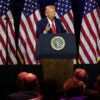The Export-Import Bank is dead. Let’s keep it that way.
This hoary relic of the Great Depression has been plagued with corruption and fraud. Its lending practices primarily benefit a handful of wealthy American mega-corporations and, far too often, unsavory interests abroad.
Ex-Im’s charter expired on June 30, but special interests continue to press Congress to revive it. Lawmakers wishing to keep this monument to crony capitalism dead and buried can draw some valuable “how-to” lessons from past successful efforts to resist wasteful special-interest pleadings.
In 1988, Congress established the BRAC (Base Realignment and Closure) Commission to close unnecessary and expensive military bases. For years, successive administrations had treated basing decisions as political bonbons, keeping certain bases open for their friends while closing others.
Congressmen and senators were unwilling to bear the weight of making rational closure decisions themselves. Voting to close a base in one’s home state carried severe political risk. And if politicians in one state voted to close a base in another state, the congressmen and senators from that state would likely return the favor.
Local economies often grow dependent on military bases. So even if keeping a base open was fiscally irresponsible (from a federal perspective) and wholly unnecessary for the nation’s security, the parochial interests of constituents usually trumped national interests for congressmen and senators.
Enter the BRAC process. It allowed lawmakers to escape voting on individual base closures. Instead, they would cast a single up-or-down vote on a package of closures recommended by non-political and military experts. With this arrangement, members could reassure their constituents that they were acting in the best interest of the nation, not targeting a hometown base for closure.
Creating the BRAC Commissions process required strong congressional leadership, the same type of leadership that is desperately needed now to fight the favoritism and cronyism that pervade Washington.
Lawmakers should also look back to how they were finally able to ban “earmarks” four years ago. “Earmarking” was the appropriations practice that allowed members of Congress to “bring home the bacon” by directing federal funds to friends and supporters back home. Over 70 percent of Americans believed that earmarks were wasteful and should be discontinued. Privately, many members of congress agreed. But when a public vote was taken in the Senate in 2010, the proposed ban on earmarks failed 39-56.
Lawmakers feared that openly voting against earmarks for their constituents would be as politically perilous as voting to close the local military base. Continuing a process that let them bring home lots of money for all kinds of projects was the safer choice—even if it was hugely wasteful.
The earmark ban finally succeeded after Senate Republican leaders worked to arrange a non-public vote within the Republican Conference. The ban won by one vote on paper, and then by acclamation. After Republicans publicly announced their ban in the Senate, Speaker John Boehner led the effort in the House to end earmarks. Eventually Democrats followed suit in the Senate.
We need this kind of thinking again to strike another blow against cronyism in Washington by permanently killing the Export-Import Bank. The problem is similar: although Ex-Im’s primary beneficiaries are few, a lot of congressmen and senators still support the bank because fat-walleted lobbies like the U.S. Chamber of Commerce and the National Association of Manufacturers campaign fiercely to make sure their “house” bank doesn’t go away.
If congressional leaders let themselves be pressured into tacking Ex-Im reauthorization onto the highway funding bill or some other unrelated, “must-pass” legislation, they will make it harder for lawmakers to do what’s right for the country.
But leadership can also save members from themselves. If they don’t bring Ex-Im up for a vote, members won’t be forced to choose between cronyism and the common good. Ex-Im will finally take its rightful place alongside earmarks—on the ash heap of history.
BRAC and the earmarks fight show that Congress can, in fact, do the right thing even when challenged by politically powerful special interests. Congressional leaders should apply this strategy to Ex-Im by keeping it out of huge, unrelated bills.































